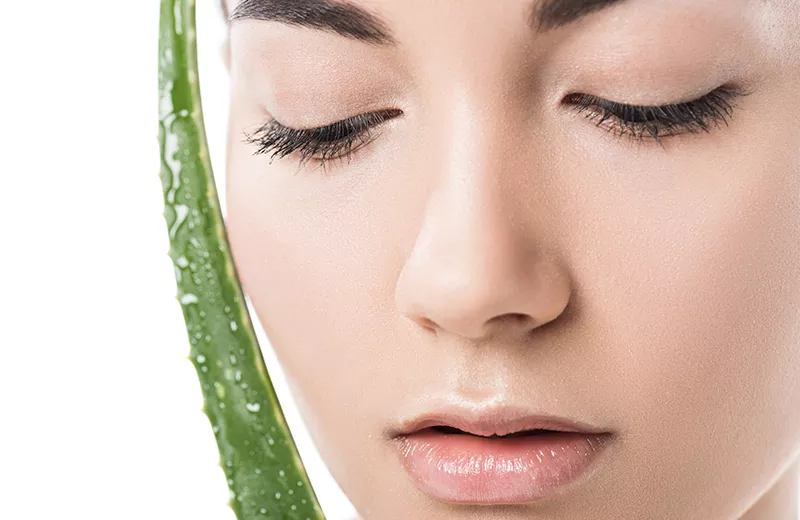Aloe Vera, a member of the Asphodelaceae family, has been a cornerstone in traditional medicine for thousands of years. Its name originates from the Arabic word “Alloeh,” signifying “shining bitter substance,” and the Latin word “Vera,” meaning “true.” With over 300 species, Aloe Vera is primarily found in South Africa, Madagascar, and Arabia. The plant’s leaves yield two significant products: the latex and the gel, rich in beneficial components like anthraquinones and polysaccharides, most notably acemannan. These substances have been found to act individually or synergistically to provide many health benefits.
Skin Healing Marvel
Aloe Vera’s gel is particularly renowned for its skin-healing properties. It’s widely used in cosmetics such as moisturizers, sunblocks, and other products. The gel’s ability to treat wounds, burns, insect stings, and skin inflammation is well-documented. Its anti-inflammatory, antiseptic, antimicrobial, and antitumor properties are crucial in skin protection and wound healing. Aloe Vera also promotes new hair growth by increasing blood circulation to the scalp and providing essential minerals and vitamins.
| Component | Benefit |
|---|---|
| Vitamins | A, C, E, and B12 contribute to skin health and immunity. |
| Enzymes | Aid in breaking down fats and sugars for better digestion. |
| Minerals | Essential for enzymatic systems and metabolic pathways. |
| Amino Acids | Building blocks of proteins, crucial for the body’s functioning. |
Pharmacological Potency
Beyond its cosmetic applications, Aloe Vera has significant pharmacological properties. Its wound-healing components, like tannic acid and polysaccharides, repair damaged tissues. Aloe Vera has shown promising results in treating various conditions, including skin exposure to UV and gamma radiation, where it supports healing and offers a protective effect. Its antibacterial properties inhibit the growth of several microorganisms, particularly those causing food poisoning or diseases in humans and animals.
| Benefit | Description |
|---|---|
| Anti-Diabetic | Helps in reducing blood sugar levels. |
| Antibacterial | Inhibits the growth of harmful bacteria. |
| Antioxidant | Scavenges harmful free radicals from the body. |
| Immunomodulatory | Stimulates macrophages to boost the immune system. |
Moisturizing and Anti-Aging Effects
Aloe Vera is a critical ingredient in over 95% of dermatologically valuable products due to its incredible moisturizing properties. It hydrates the skin, aids in dead skin cell removal, and promotes collagen and elastin fiber production. This makes the skin more elastic and less wrinkled, effectively reversing skin aging signs. Its ability to soften the skin and restore its former suppleness benefits the face and feet.
| Application | Benefit |
|---|---|
| Wound Healing | Speeds up the healing process of burns and cuts. |
| Moisturizing | Keeps the skin hydrated and supple. |
| Anti-Aging | Reduces the appearance of wrinkles and fine lines. |
| Digestive Health | Soothes and heals the digestive tract. |
| Oral Care | Reduces dental plaque and heals mouth ulcers. |
Anti-Diabetic Impacts
The gel is also known for its anti-diabetic effects, significantly reducing blood sugar levels by enhancing glucose metabolism. These properties make Aloe Vera a versatile agent in the pharmaceutical industry, where it’s used to produce topical products like ointments, gel preparations, and tablets and capsules.
Nutritional Spectrum of Aloe Vera
Aloe Vera isn’t just a topical wonder; it’s a nutritional powerhouse. Its gel contains over 75 potentially active constituents, including vitamins, enzymes, minerals, sugars, lignin, saponins, salicylic acids, and amino acids. The gel’s vitamin content, including A, C, E, and B12, contributes to skin health, immunity, and overall well-being. Aloe Vera’s enzymes aid digestion by breaking down fats and sugars, while its bradykinase helps reduce inflammation. The plant’s rich array of minerals like calcium, sodium, potassium, and manganese is essential for adequately functioning various enzymatic systems and other metabolic pathways.
Aloe Vera and Digestive Health
Beyond its skin and pharmacological benefits, Aloe Vera has a marked impact on digestive health. It’s known for its soothing and healing effects on the digestive tract. Aloe Vera juice is often used to treat conditions like acid reflux, ulcers, and irritable bowel syndrome. Its laxative properties, attributed to the compound aloin, help relieve constipation. The plant’s anti-inflammatory components can soothe and reduce gastrointestinal inflammation, promoting a healthy gut.
Immunomodulatory Effects
Aloe Vera is also recognized for its role in modulating the immune system. The plant’s polysaccharides have been found to stimulate macrophages, white blood cells that fight viruses and other diseases. This immunomodulatory effect helps the body fend off diseases and controls overactive immune responses, which can lead to conditions like allergies or autoimmune diseases.
Aloe Vera in Oral Care
The benefits of Aloe Vera even extend to oral health. Its natural anti-bacterial and anti-inflammatory properties make it valuable in tooth gels. Aloe Vera toothpaste and mouthwashes effectively reduce dental plaque, heal mouth ulcers, and fight gum diseases. Its soothing properties help in reducing gum inflammation and enhancing oral hygiene.
Aloe Vera stands as a testament to nature’s healing and nourishing capabilities. Its wide array of benefits, ranging from skincare, nutrition, and digestive health to immunomodulation and oral care, makes it a valuable and versatile plant. As we continue to understand and harness its full potential, Aloe Vera will undoubtedly play a pivotal role in both traditional remedies and modern medicine. Embracing this miraculous plant can lead to a healthier, more balanced life, reflecting the ancient wisdom that nature often holds the best solutions to our health needs.
Source: https://saudijournals.com





